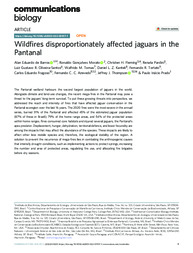Wildfires disproportionately affected jaguars in the Pantanal.
Wildfires disproportionately affected jaguars in the Pantanal.
Author(s): BARROS, A. E. de; MORATO, R. G.; FLEMING, C. H.; PARDINI, R.; OLIVEIRA-SANTOS, L. G. R.; TOMAS, W. M.; KANTEK, D. L. Z.; TORTATO, F. R.; FRAGOSO, C. E.; AZEVEDO, F. C. C.; THOMPSON, E. J.; PRADO, P. I.
Summary: The Pantanal wetland harbours the second largest population of jaguars in the world. Alongside climate and land-use changes, the recent mega-fires in the Pantanal may pose a threat to the jaguars? long-term survival. To put these growing threats into perspective, we addressed the reach and intensity of fires that have affected jaguar conservation in the Pantanal ecoregion over the last 16 years. The 2020 fires were the most severe in the annual series, burned 31% of the Pantanal and affected 45% of the estimated jaguar population (87% of these in Brazil); 79% of the home range areas, and 54% of the protected areas within home ranges. Fires consumed core habitats and injured several jaguars, the Pantanal?s apex predator. Displacement, hunger, dehydration, territorial defence, and lower fecundity are among the impacts that may affect the abundance of the species. These impacts are likely to affect other less mobile species and, therefore, the ecological stability of the region. A solution to prevent the recurrence of mega-fires lies in combating the anthropogenic causes that intensify drought conditions, such as implementing actions to protect springs, increasing the number and area of protected areas, regulating fire use, and allocating fire brigades before dry seasons.
Publication year: 2022
Types of publication: Journal article
Unit: Embrapa Pantanal
Observation
Some of Embrapa's publications are published as ePub files. To read them, use or download one of the following free software options to your computer or mobile device. Android: Google Play Books; IOS: iBooks; Windows and Linux: Calibre.
Access other publications
Access the Agricultural Research Database (BDPA) to consult Embrapa's full library collection and records.
Visit Embrapa Bookstore to purchase books and other publications sold by Embrapa.

